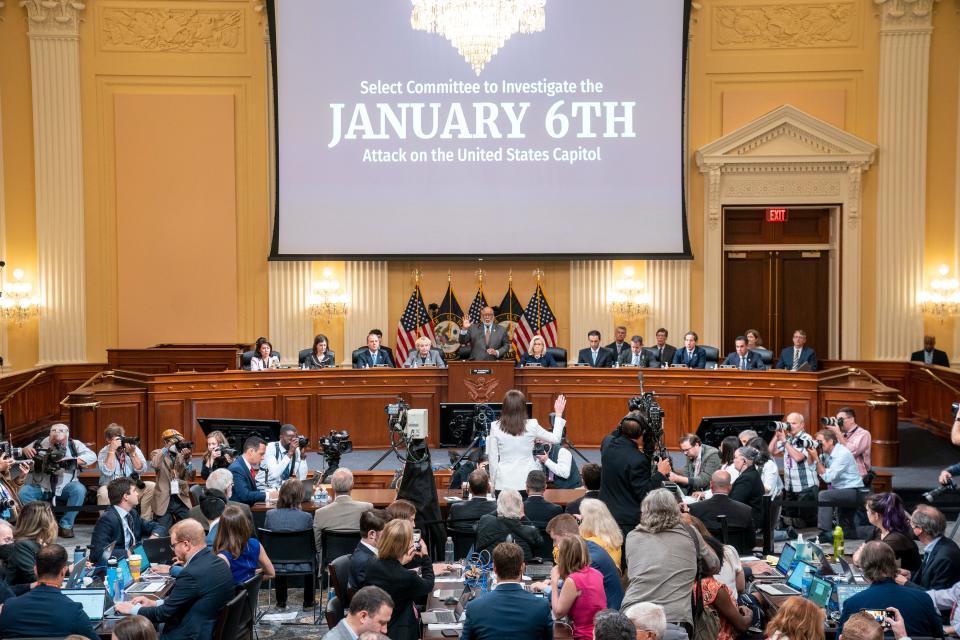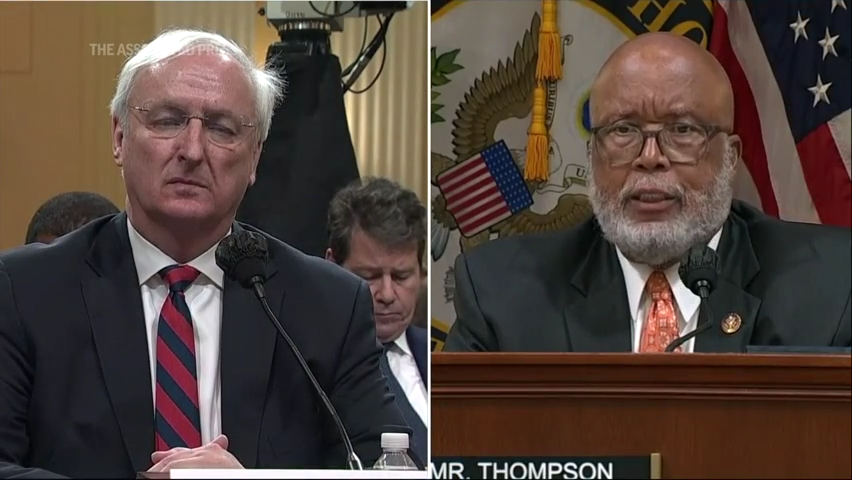Jan. 6 committee promises more hearings this fall. What we know (and don't) about what happens next
- Oops!Something went wrong.Please try again later.
- Oops!Something went wrong.Please try again later.
- Oops!Something went wrong.Please try again later.
After more than 100 subpoenas, dozens of depositions and millions of viewers, the House committee investigating the Jan. 6 attack on the U.S. Capitol concluded its eighth hearing Thursday with little resolution, even more questions and the promise of more hearings.
In his opening remarks, the committee's chairman, Rep. Bennie Thompson, D-Miss., said more hearings are coming in September. The panel's vice chair, Rep. Liz Cheney, R-Wyo., signaled the committee hasn't hit its end point.
“Let me assure every one of you this: our committee understands the gravity of this moment. The consequences for our nation. We have much work yet to do,” Cheney said, before adding: “We will see you all in September."
The committee is expected to produce a report this fall outlining its findings and recommendations, but it has not set a deadline for its release. The substance of the September hearings likely hinges on additional details the committee's investigation could uncover. The committee is tugging at several loose threads, and a few outside factors – including the Justice Department's own investigation – that could change its schedule.
187 Minutes: On Jan. 6, Trump was out of public view as aides urged him to act
"This investigation is very much ongoing," Rep Zoe Lofgren, D-Calif., said Sunday during an appearance on ABC's "This Week." "It's very active, new witnesses are coming forward, additional information is coming forward. There are things that we're looking at still."
Here is what we know (and don't know) about what is next for the House Jan. 6 committee.
Loose threads
The committee has several loose threads that could be significant in additional hearings, in much the same way that ex-White House aide Cassidy Hutchinson's testimony prompted a last-minute hearing in June.
What does the Secret Service have to say? The committee issued a subpoena for Secret Service text messages on Jan. 5-6, 2021, but the agency said the messages had been deleted in a migration to new phones. The agency charged with protecting the president also said it would make personnel available for additional testimony after Hutchinson described a scene, told to her by someone who was present, in which Trump allegedly lunged at an agent and tried to grab the steering wheel of the presidential transport after he was told he could not go to the Capitol on Jan. 6. At Thursday's hearing, Rep. Elaine Luria, D-Va., said some Secret Service personnel had retained new private counsel. The Department of Homeland Security's inspector general has launched a criminal investigation into the deleted texts.
Could Mike Pence testify? The pressure campaign by Trump's inner circle to convince the former vice president to stop the counting of electoral votes was a key point in the early committee hearings, but the committee has not heard from Pence – yet. "I personally want to talk to Mike Pence. I think there's a difference between, do we subpoena him, do we ask him for a transcribed interview? I think it would be important to hear everything he has to say," Illinois Rep. Adam Kinzinger, one of the committee's two Republicans, said during an interview on CBS News' "Face the Nation."
Will legal action compel other witnesses to testify? The committee has referred several cases of witnesses refusing to comply with subpoenas to the Justice Department. Former Trump adviser Steve Bannon is fighting a contempt charge for his refusal to cooperate.
Could other witnesses emerge? New witnesses cooperating with the Jan. 6 committee could prompt additional hearings. For example, Trump's former chief of staff Mark Meadows so far has not spoken to the committee, but the Justice Department declined to prosecute him for contempt.
Subscribe: Click here to subscribe to USA TODAY's "On Politics" newsletter

Political futures
Before the committee issues its final report, its vice chair and top Republican could be on the chopping block. Rep. Liz Cheney faces a Trump-backed opponent who is polling well ahead of the three-term incumbent in Wyoming's GOP primary on Aug. 16.
Other members of the committee also face uncertain futures.
Tough challenges: Cheney, R-Wyo., trails her primary opponent by 22 points in the latest Casper Star Tribune poll as she weathers the blowback from crossing Trump. Rep. Elaine Luria, D-Va., is running in a toss-up district that was redrawn to be more Republican.
Out of the running: Kinzinger, one of the few Republicans to vote for Trump's second impeachment, is not running for another term. Rep. Stephanie Murphy, D-Fla., also is not running for reelection.
Safe and sound: The remaining Democrats on the committee are all running in districts rated as solidly blue by the Cook Political Report.
Secret Service: Secret Service agents feared for their lives during Capitol attack, made goodbye phone calls

The Jan. 6 report
Once its investigation is complete, the committee is required to produce a report on the causes of the Capitol riot and any lessons learned. The report is to include "findings, conclusions, and recommendations for corrective measures."
Lessons learned: Any of the "corrective measures" the committee suggests must fall into a few categories.
Preventing future attacks against American democratic institutions
Improving security at the Capitol Complex
Improving the "security and resilience" of American democratic institutions against violence and domestic terrorism
When it drops: Committee members so far have made only vague references to the report coming in the fall, with the potential for more hearings to follow. Lofgren said on ABC that an "interim report" also was forthcoming before its final report.
"As we came into the end of this series of hearings, we thought this might be a point where we transitioned in an effort to make sure that we had documented and focused on the recommendations," Luria said on CNN's "State of the Union." "I'd say that we are still full speed ahead on the hearing, as well as full speed ahead on those other elements of what we have a responsibility to do as a congressional committee."
Ketchup, regrets, blood and anger: A guide to the Jan. 6 hearings' witnesses and testimony
Criminal referrals
The Jan. 6 Committee does not have the power to bring criminal charges, but the Justice Department could – and committee members have been applying public pressure for the department to take action.
The Justice Department's ongoing criminal investigation has resulted in charges against 800 people so far, and it is investigating two attorneys who backed Trump's efforts to overturn the 2020 election. The committee already has referred one case of possible witness tampering to the department after Trump allegedly called but did not speak to a committee witness.
What happened at the last hearing?: Miss Day 8 of the Jan. 6 hearings? Trump's inaction during the Capitol riot comes into focus
What else they're saying
Multiple referrals: "The Justice Department doesn't have to wait for the committee to make a criminal referral. There could be more than one criminal referral," Cheney told ABC "This Week" after Hutchinson's testimony.
Subpoena power: "I would not want to tell the attorney general how to conduct his investigations. But I will say this, they have subpoena power and they have a lot easier way to enforce their subpoenas than the Congress does. So, I presume that they are looking at everything. I would hope so," Lofgren said July 17 on ABC News' "This Week."
Letter of the law: "There's no real legal process for the so-called criminal referral. It's essentially just writing a letter to the Department of Justice saying, here's what we think, and we might well do that. But the DOJ should be looking at all of this, doing their own investigation and obviously we're cooperating with them on certain matters at their request. But they're the ones that make the criminal charges, not a legislative committee," Lofgren said.
Following the facts: “No person is above the law in this country,” Attorney General Merrick Garland said Wednesday, reiterating that the Justice Department would follow the facts and law in any investigation of Trump. “I can’t say it any more clearly than that. There is nothing in the principles of prosecution and any other factors which prevent us from investigating anyone – anyone – who is criminally responsible for an attempt to undo a democratic election.”
No rush: Garland's comments came after it was revealed this week that he issued a memo in May reminding the Justice Department about longstanding policy to remain neutral and impartial during an election year. That would seem to preclude any indictment of Trump before the November midterm election.

This article originally appeared on USA TODAY: What's next for the Jan. 6 committee with more hearings this fall

